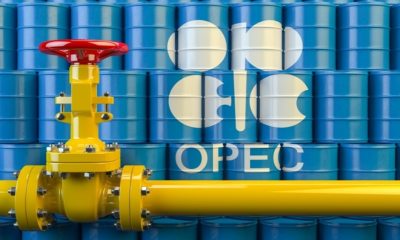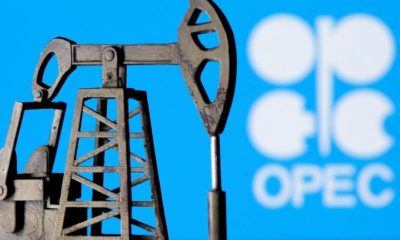- Oil Price: Nigeria, Others Commit to Exceed Voluntary Output Cut
Nigeria and other member countries of the Organisation of Petroleum Exporting Countries (OPEC) as well as their non-OPEC allies led by the Russian Federation have said they are committed to making their voluntary oil production adjustment plan work efficiently, and would in this regard follow through their respective commitments in the next coming months.
The group, according to a statement from OPEC after its recent meeting in Baku Azerbaijan, noted that overall adherence to the voluntary output cut observed by them in the ‘Declaration of Cooperation,’ framework got to 90 per cent in February, some seven per cent higher than the 83 per cent recorded in January.
The statement disclosed that Nigeria, Iraq, Kazakhstan and the United Arab Emirates (UAE), were appointed into the Joint Ministerial Monitoring Committee (JMMC) which periodically reviews developments in the oil market with regards to the adjustment framework.
“The Joint Ministerial Monitoring Committee (JMMC) convened in Baku, the Republic of Azerbaijan, for its thirteenth meeting on 18 March 2019.
“The Committee reviewed the monthly report prepared by its Joint Technical Committee (JTC) and recent developments in the global oil market, as well as immediate prospects for the remainder of 2019.
“The JMMC reiterated the critical role that the ‘Declaration of Cooperation’ has played in supporting oil market stability since December 2016 and took note of the expressed commitment of all participating countries to ensure that such stability continues on a sustainable basis, as overall conformity reached almost 90 per cent for the month of February 2019, which is up from 83 per cent in the month of January,” OPEC stated.
It explained that the committee recognised the current, critical uncertainties surrounding the global oil market throughout 2019, and indicated the need for shared responsibility of all participating countries to restore market stability and prevent the recurrence of any market imbalance.
According to the organisation, “All participating countries present at the meeting, individually and collectively, assured the committee that they will exceed their voluntary production adjustments over the coming months.
“To this end, the JMMC also urged all participating countries, including those not present at today’s meeting, to achieve full and timely conformity with their voluntary production adjustments under the decisions of the 175th Meeting of the OPEC Conference, 6 December 2018, and the 5th OPEC and non-OPEC Ministerial Meeting, 7 December 2018.”
It said that in consideration that market fundamentals were unlikely to materially change in the next two months, “the JMMC adopted a recommendation to forego the full Ministerial Meeting in April and instead schedule a JMMC meeting in May ahead of the OPEC Conference meeting on 25 June, during which a decision will be taken on the production target for the second half of 2019.”
The JMMC, it added also endorsed the adjustments of the baselines of three countries – Brunei Darussalam, Ecuador and Malaysia, while welcoming Iraq, Kazakhstan, Nigeria and the UAE as new members.

 Forex2 weeks ago
Forex2 weeks ago


 Naira2 weeks ago
Naira2 weeks ago
 Billionaire Watch1 week ago
Billionaire Watch1 week ago




 Naira2 weeks ago
Naira2 weeks ago




 Naira1 week ago
Naira1 week ago




 Naira4 weeks ago
Naira4 weeks ago
 Nigerian Exchange Limited4 weeks ago
Nigerian Exchange Limited4 weeks ago


 Naira3 days ago
Naira3 days ago


















